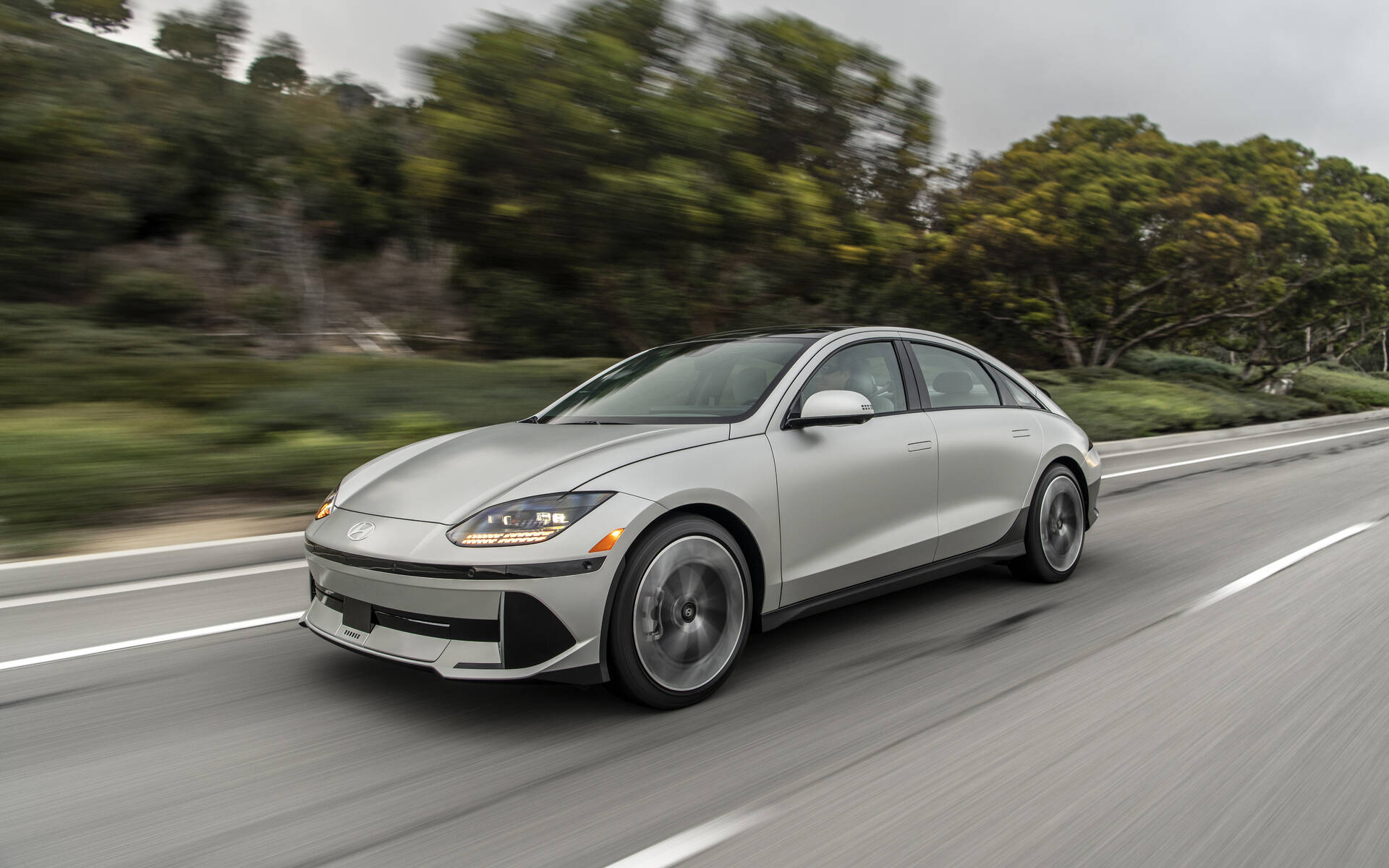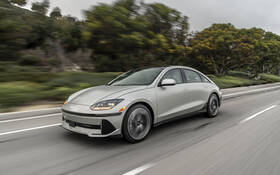2023 Hyundai IONIQ 6 Makes Official North American Debut in Los Angeles
After a long-awaited design reveal last summer, the Hyundai IONIQ 6 was officially unveiled on North American soil today at the Los Angeles Auto Show. The Car Guide Journalist Gabriel Gelinas had the opportunity to test-drive it in South Korea a few months back, giving us a taste of the driving dynamics and overall experience at the wheel of this latest electric vehicle from Hyundai.
Today, we get to see the car in its North American form with full specs and details.
- Also: 2023 Hyundai IONIQ 6: A Tough Matchup for the Tesla Model 3
- Also: Slick Hyundai IONIQ 6 to Have Way More Range Than IONIQ 5

Streamlined and Pixelated
Hyundai introduced (or brought back) a unique 90’s styling cue with the IONIQ 5’s pixel-style lighting in the front and in the rear, making the electric as singular as possible. The IONIQ 6 gets the same treatment. There are no less than 700 parametric pixels in the headlights, taillights and inside the cabin to further enhance the futuristic/vintage feel.
Our South Korean tester was fitted with slim digital mirrors (cameras), which are not approved for road use here in North America. As you can see on the images, the finished product aimed at our market gets a pair of good old physical mirrors that follow the vehicle’s streamlined design.

Otherwise, the overall design is a clever mix of old and new, but the swooping, boattail rear end isn’t just another clever Hyundai design feat. Thanks to this (and other exterior features like a full underbody cover and reduces wheel-arch gaps), the IONIQ 6 delivers and drag coefficient of 0.22.
Performance and Range
The IONIQ 6 is geared with a 77.4 kWh battery pack that can be paired to AWD and RWD configurations. The AWD setup will churn out 320 horsepower and 446 lb-ft of torque, while the RWD configuration delivers 225 horsepower and 258 lb-ft of torque.
Here’s where it gets really interesting. Hyundai claims that the RWD setup lets you drive, in ideal conditions, for up to 547 kilometres (estimated). The maximum range for the AWD configurations sits at a very decent 499 kilometres.
Since the IONIQ 6 is built on the same platform as the IONIQ 5 (and the Kia EV6), we're assuming it will offer a maximum charging capacity of around 225 kW when plugged into a 350 kW fast charger, which means it meants it will be able to go from 10 per cent to 80 per cent in 18 minutes. Still according to the manufacturer, the IONIQ 6 will be able to recuperate around 100 kilometres of range in 5 minutes on the same fast charger.

Because battery conditioning is a key factor to maximize charging speeds – especially in Canada’s worst weather conditions – the IONIQ 6 is fitted with a pre-conditioning system that heats up the battery. Te feature activates automatically when a charging point is entered into the navigation system in similar fashion as a Tesla would, for example.
In terms of driving dynamics, Hyundai underlines that the IONIQ 6 is fitted with electric torque vectoring that uses partial braking and motor torque when for optimal cornering. It also has four driving modes (ECO, Comfort, Sport and Snow) and a custom mode that allows the driver to modulate steering, power output, accelerator pedal pressure sensitivity and driveline (AWD / auto AWD / 2WD) to provide a tailored driving experience depending on what the driver wants to focus on performance or range, without having to compromise all factors at the same time.
A Digitally Dynamic Interior
The swooping roofline has its downsides. On top of having limited headroom for rear passengers as underlined by The Car Guide Journalist Gabriel Gelinas in his recent test-drive, the rear cargo volume also seems limited on paper, with only 316 litres of space. However, the platform’s completely flat floor allows for plenty of space up front for legroom and shoulder room. It features the famed twin-screen combo composed of a 12.3-inch full-touch infotainment display and 12.3-inch digital cluster. For added fun and ambiance, users can choose from a spectrum of 64 colours and six-dual colour themes.

Just like the IONIQ 5, the 6 is fitted with the V2L (vehicle to load) function, which lets owners plug electric devices to the vehicle and use the battery as a charger. Hyundai also underlines that the power can even be transferred to another vehicle to give it a boost in order for it to get to the nearest charging station.

As electrification takes over the industry, many car enthusiasts worry about the future of automotive sounds, and the systems that manufacturers desperately develop often times poorly to simulate them. Hyundai says the IONIQ 6 is fitted with a virtual propulsion sound called electric-Active Sound Design that uses an acoustic design processor to “provide unique driving sounds inside the cabin and the ability to set the volume.” We’ll have to see what comes out of this!
The 2023 IONIQ 6 will hit the market i the spring of 2023. Pricing will be announced at a further date.












